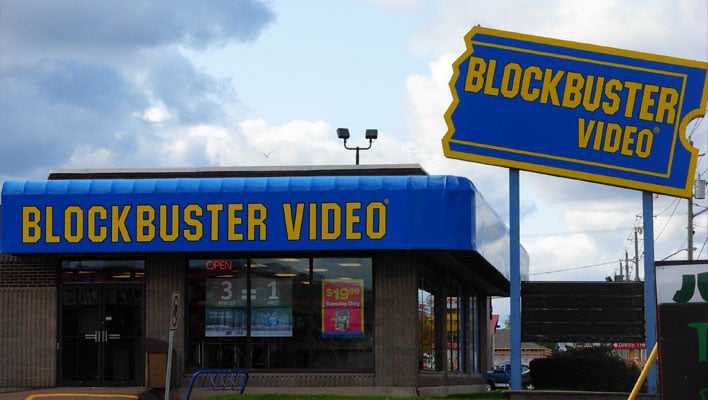Former Blockbuster CEO Exonerates Netflix Of Murdering The Video Rental Giant

Back in its heyday, Blockbuster was the go-to store for renting movies on VHS tapes and, later, DVDs. There were over 9,000 brick-and-mortar Blockbuster stores at its height, along with more than 84,000 employees. I remember the mom-and-pop video store I worked at as assistant manager having a bear of a time trying to compete in the late 1990s (shout out to the ghost of Move Magic Plus in Portage, MI). But that's all ancient history now, with streaming services like Netflix having killed off the chain. Or did it?
Technically, Blockbuster still exists—there's a lone store remaining, located in Bend, Oregon. It inspired a one-season TV series called Blockbuster starring Randall Park, which is available to stream on Netflix. Talk about twisting the knife, though according to James Keyes, who served as chairman and CEO of Blockbuster before it was bought and largely shuttered by Dish, Netflix is not responsible for the death of the once-dominant video rental chain.
Keyes details Blockbuster's decline in his new book, Education Is Freedom: The Future Is In Your Hands (available on Amazon), which Kate Magee at Management Today breaks down with a handful of interesting excerpts. According to Keyes, Blockbuster was in position to not only compete with Netflix, but beat it outright after having acquired Movielink, a streaming company, for $6.6 million in 2007.
"We were very well positioned to succeed over Netflix because we had arguably a superior offer," Keyes writes.
That acquisition gave Blockbuster access to thousands of movies. Furthermore, Keyes was orchestrating an "exciting" deal with Google in 2009 that would put paid content on Blockbuster's on-demand service alongside free videos on YouTube. But a boatload of deferred debt, reports of a looming bankruptcy, and a damning article by The New York Times are what Keyes places the blame on for the chain's ultimate demise.
According to Keyes, the press ignored the fact that Moody's, a credit ratings agency, was somewhat optimistic about Blockbuster's situation—Moody's issued the chain a two-point upgraded due to its operating improvement. However, it also warned that Blockbuster could default on its debt repayment.
"The press didn't care about the ratings increase, which ironically gave me a better chance to refinance the debt at a reasonable rate. The probability to fail just was a killer headline. All of a sudden, the press started saying Blockbuster was going to file for bankruptcy. We had no intention of doing so," Keyes claims, according to Magee's breakdown of the book.
Keys goes on to say that he was highly confident Blockbuster was capable of transforming into a streaming media company. He claims people on the outside were unaware of the looming Google deal, and points to strategic partners that, in his estimation, would have been "game changers."
"I had reason to have confidence at the time. But when spin gets out there, it can create a run on the bank," Keyes laments.
We all know what ultimately happened—Blockbuster did end up filing for bankruptcy and eventually shutting down every store save for one, while Netflix went on to become a streaming behemoth. The transformation that Keyes was so confident that Blockbuster would pull off, was ultimately achieved by Netflix when it pivoted from a DVD-by-mail service to a streaming giant in its own right.
Who knows what might of happened had Blockbuster been able to survive its debt repayment.
Top and thumbnail image source: Stu pendousmat at English Wikimedia

